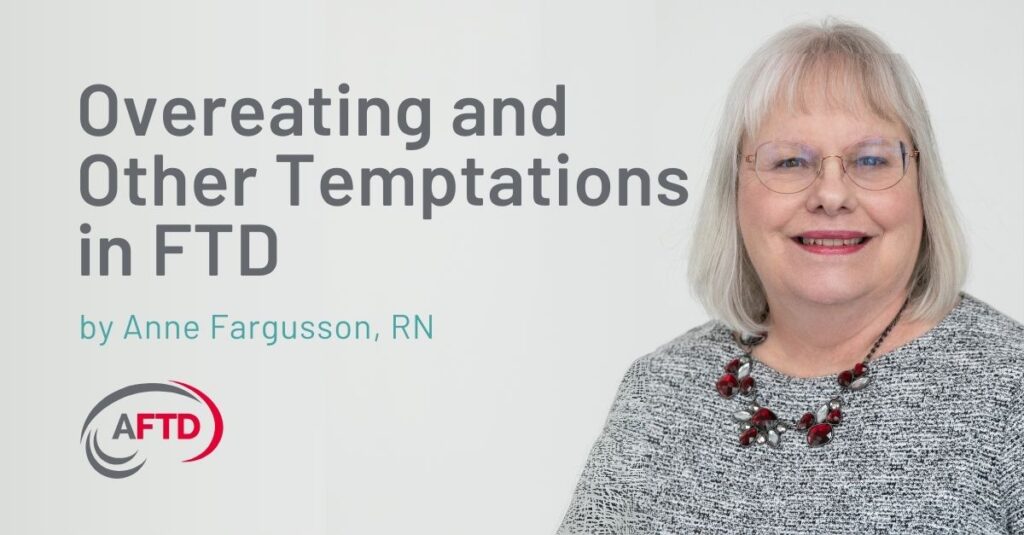The Lived Experience of FTD: Overeating and Other Temptations in FTD
By Anne Fargusson, RN, AFTD Persons with FTD Advisory Council Among the hallmark symptoms of FTD is an oral fixation, which can lead to overeating. FTD may also cause a craving for sweets: candy, cake, pie, ice cream. Combined, these two tendencies can lead to significant weight gain and a lower quality of life. Some…
Read MoreAdvancing Hope: AFTD Hosts 2025 Holloway Summit
Can the risk of developing FTD be changed by environmental exposures, lifestyle, diet, and other factors? Are the genetic risks fully understood? These questions are regularly asked by affected families and at-risk individuals. On January 22-24, 2025, the third annual AFTD Holloway Summit convened academic scientists, nonprofit partners, persons with lived experience, and AFTD staff…
Read MorePair of Studies Make Significant Findings in Search for FTD Biomarkers
Two recent studies on proteins and FTD are helping to lay the foundation for the potential development of diagnostic and prognostic FTD biomarkers, a Feb. 9 Alzforum post reported. Studies Identify Relationships Between Certain Proteins and FTD Disorders Getting an FTD diagnosis is an extensive process that can involve multiple rounds of cognitive or behavioral…
Read MoreFTD Research Spotlight: Making FTD visible by investing in diagnostic biomarkers: a new funding opportunity
FTD researchers know the importance of identifying and validating usable biomarkers for FTD – and just how complex these tasks are. FTD-specific biomarkers could help to achieve many unmet needs for families and researchers: improved diagnostic accuracy and sensitivity, improved prognosis prediction, identification of which people suffer from which types of pathology, and accelerated drug…
Read MoreDear HelpLine: Looking for Support Options
Dear HelpLine, My brother was diagnosed with FTD. I see that AFTD offers support groups, but I’m not sure who they are for, or which one is right for me. Can you help me understand my options? AFTD strives to support FTD care partners, the close family members and friends who provide care to persons…
Read More20th Annual Holy Half Marathon
Colleen Quinn and her family are participating in the 2025 Holy Half Marathon in memory of Colleen’s father Ed McAndrew. This half marathon’s course takes place along the University of Notre Dame’s campus and includes several of the University’s famous landmarks.
Read More3rd Annual Ball to End Dementia Basketball Tournament
Amar Sharma is hosting the third Ball to End Dementia Tournament at his high school. This tournament will have it all: basketball, prizes, food, raffles, half-time games, and more! Students will form teams to compete in a basketball tournament. The champions will then play a team of faculty members for a grand prize. The proceeds…
Read MoreMaine Coast Marathon
Emily Chadwick and her husband are running in the Maine Coast Marathon in honor of her father James who has been diagnosed with FTD. “Marathon training has been such a great outlet for me as I process my dad’s illness and I am glad to have found AFTD so I can put the miles to…
Read MoreDiehard Taxi Replica Car Show
Alan Persaud created a life-size replica of the taxi from Die Hard as a homage to Bruce Willis and the movie Die Hard with a Vengeance. He has been showing off his taxi at car shows and events in the UK and sharing information about FTD and AFTD to help spread awareness. If you want…
Read MoreStudy Examines Nature of Criminal Risk Behaviors in Dementia
An Australian Study uses an experimental screening tool to examine the propensity and nature of criminal risk behaviors in dementias like FTD. While further research is needed to better understand criminal risk and dementia, the study finds that these behaviors may be more common than previously expected and occur across dementia types. Study Shows More…
Read More









